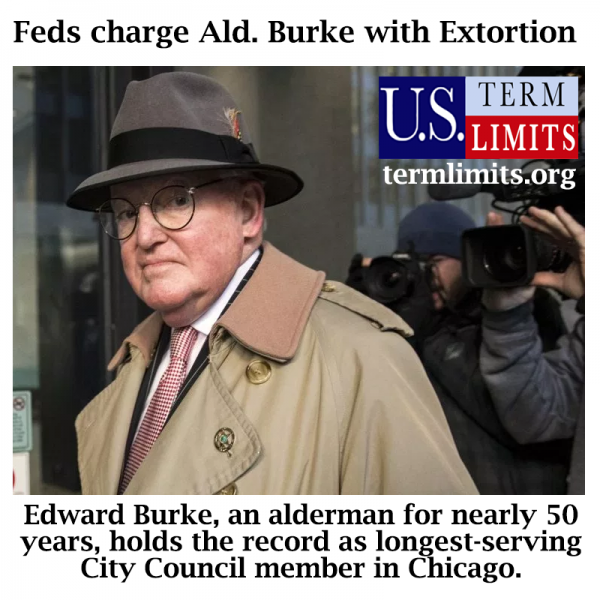By Philip Blumel
 On Jan. 2, the FBI lodged a 37-page criminal complaint against Edward Burke, a 50-year incumbent on Chicago’s city council. Since 1983, he has chaired the city’s powerful finance committee. During that time he has apparently also been using his position to shake down individuals and companies for money.
On Jan. 2, the FBI lodged a 37-page criminal complaint against Edward Burke, a 50-year incumbent on Chicago’s city council. Since 1983, he has chaired the city’s powerful finance committee. During that time he has apparently also been using his position to shake down individuals and companies for money.
For much of 2017, federal agents followed him around and recorded his phone calls and eventually raided his office. The FBI says that Burke insisted that a chain of fast-food restaurants, including a Burger King, hire his law firm, Klafter & Burke, to handle their tax affairs in Illinois. Burger King didn’t need a new tax firm, so they settled on a $10,000 “donation.”
The FBI also says that Burke withheld a city permit from a restaurant owner who wanted to renovate until the businessman wrote Burke a big check.
Etc. Etc. Etc.
That this case should arise in Chicago is hardly surprising, as a University of Illinois study from 2018 called Chicago “the most corrupt city in the U.S.” Its author, political science professor Dick Simpson, estimated that there have been 200 council members (or alderman, as Chicagoans call them) since 1969 when Burke first got elected. Of them, 33 have been arrested for corruption including extortion, bribery and fraud.
A survey in 2016 found that more than 90% of Chicago business leaders observe cronyism in city government.
Of the 10 largest cities in America, Chicago is also the only one without term limits on its city council or mayor.
Term limits discourage corruption as corruption is highly correlated with tenure in power, as long tenure both breeds arrogance and provides opportunity.
Term limits also encourage transparency, as the critical institutional knowledge is not bottled up among a team of entrenched incumbents. Instead, you have a regular stream of ex-council members constantly being created who have intimate knowledge of the system. Meanwhile, new members come in and review the system with fresh perspectives.
Voters know this and in 2018 about 60% of voters told pollsters they supported term limits on the Chicago council.
In 2018, there was a serious attempt to put mayoral term limits on the Chicago ballot. Led by former Democratic Gov. Pat Quinn, the requisite signatures were collected and the measured OK’d for the ballot. However, under state law, only three ballot questions can appear on the city ballot in one election. The Chicago City council promptly approved additional advisory questions – for which zero signatures had been collected — so that the term limits measure would be crowded out. One non-binding question read “Should the city of Chicago ban the use of plastic straws within the corporate limits?”
Gov. Quinn called this a “sabotage tactic.” It is also fair to call it “corrupt.”
Guess who sponsored the measure to boot term limits off the ballot?
Alderman Ed Burke.